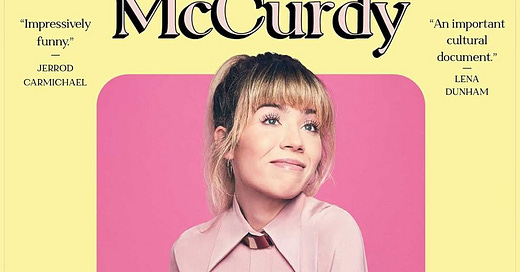Rating: ★ ★ ★ ★ ★
I put off reading this book for a long time. As a fellow daughter of a narcissistic, emotionally abusive mother, I was afraid it would hit too close to home and bring up too many uncomfortable feelings. I was right. But I’m still glad I read it.
If you were born in the 90s (or have younger siblings who were, like I do), you probably remember Jennette McCurdy from iCarly on Nickelodeon. She played Sam, who apparently had an affinity for fried chicken and hitting people with a sock full of butter? I don’t know. I never watched it, and after reading this book, I probably never will out of respect for Jennette, because she would prefer not to remember iCarly at all.
In I’m Glad My Mom Died, Jennette explains that she never wanted to act, but her controlling, manipulative, and abusive mother forced her into it. It’s a disturbing story, but Jennette manages to tell it with humor, warmth, and optimism. The book reads less like a memoir and more like a narrative written from the perspective of Jennette at various ages. Each memory she describes in vivid detail is significant to her life and the story, culminating in her finally discovering who she is apart from her mother and living the life she always wanted and deserved.
While Jennette’s childhood was obviously quite different from mine (I never starred in a hit TV show), I can still relate to many parts of her story: the overbearing mother who vacillated between fits of violent rage and crocodile tears, the whole family walking on eggshells to avoid setting her off, being criticized and insulted for doing or saying anything that isn’t exactly what Mom wants, being constantly called fat despite being skinny, being unable express any feelings without getting yelled at, desperately clinging to anything that gives you even the illusion of control over your own life, aspects of abuse being connected to backwards religious beliefs, and more. I even felt moved to highlight the lines that resonated with me the most. Here are a few of them:
“…for as far back as I can remember, the air in the house has felt like a held breath.”
“I want her to know me for who I’m becoming. I want her to allow my growth. I want her to want me to be me. But that feels more like a fantasy than a possibility…”
“…this way of communicating—polite small talk with an undercurrent of pain and resentment—has become our new reality…”
“This thing in Mom drives me nuts. This thing where she yearns to be pitied.”
“It’s easier to be angry than to feel the pain underneath it.”
“I’m processing…the grief of a childhood, adolescence, and young adulthood that I feel I had never truly been able to live for myself.”
“My mom didn’t deserve her pedestal. She was a narcissist. She refused to admit she had any problems, despite how destructive those problems were to our entire family.”
“I was conditioned to believe any boundary I wanted was a betrayal of her…”
As I predicted, reading this book brought up a lot of personal feelings and memories that I’d rather not unpack (and probably should), but Jennette’s writing was so entertaining that it was definitely worth the read. Her style is different from any other memoir I’ve read. It felt more like I was reading an engrossing novel that I couldn’t put down.
I’m incredibly proud of Jennette for having the courage and strength to write this important memoir. As she mentioned in the book, society tends to revere mothers and worship them as paragons of virtue and selflessness:
“Moms are saints. Angels by merely existing…No one but moms know the hardship of motherhood, and we non-moms must heap nothing but praise upon moms because we lowly, pitiful non-moms are mere peasants compared to the goddesses we call mothers.”
Talking about “deadbeat dads” is socially acceptable, but nobody wants to talk about toxic mothers, and when anyone does, they’re criticized for it. People say things like, “Your mother gave you life!” “You only get one mother!” and “You’ll miss her when she’s gone!” So children of abusive mothers are reluctant to share their stories, and they keep their feelings hidden. Many even convince themselves that everyone else is right, they must have remembered it wrong, maybe their mother wasn’t as bad as they thought. None of that is healthy. This is a public conversation that is long, long overdue, and I’m glad we’re finally having it thanks to courageous young people like Jennette.
While Jennette does mention the various roles she portrayed and many of the people she worked with throughout her miserable acting career (including “The Creator” of many Nickelodeon shows, who was abusive in his own right), I’m Glad My Mom Died is more focused on her personal life with her family and struggles with anorexia, bulimia, and OCD. Many parts will make you cringe, others will make you cry, and many more will make you laugh. The ending will make you smile and maybe cry happy tears. I did. I bawled like I was watching one of those Sarah McLachlan sad puppy commercials on PMS.
I think everyone should read this book. Seriously. Everyone. That includes you! If you grew up in a dysfunctional family, you’ll feel validated and empowered. If you didn’t, you’ll gain a better understanding of people who did. Either way you’ll be entertained and probably learn something. Go buy it on Amazon and read it right now!




